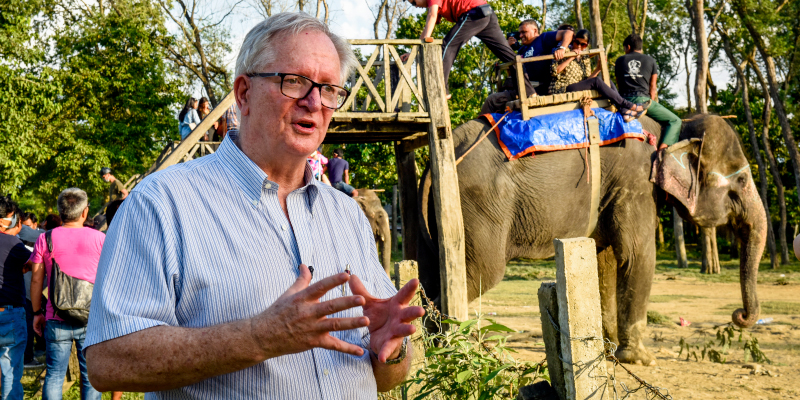
When it comes to the field of socio-ecology, Nelson Institute graduate Steven Lawry has written the book (or, at least, one of them). An expert on land and forest rights, his work spans the globe — from Botswana to South Sudan and Liberia to Indonesia to India and to Yellow Springs, Ohio, and Cambridge, Massachusetts. His impact has also been felt here in Madison through his longtime support of graduate students in the socio-ecological field. In 1999, he established the Steven W. Lawry Graduate Fellowship, which in 2004, became part of the Wisconsin Distinguished Graduate Fellowship Program. In 2020 — to celebrate the Nelson Institute’s 50-year anniversary, the fellowship was renamed as the Aldo Leopold Land Ethic Wisconsin Distinguished Graduate Fellowship. And now, Lawry’s support is entering its next chapter as it becomes the Aldo Leopold Graduate Research Award.
“Ecology, ecosystems, biogeochemistry, conservation, biodiversity … These are all fundamentally intertwined with humanity, society, and economy, whether we like it or not,” says Paul Robbins, dean of the Nelson Institute. “By providing crucial support for students who take that complexity seriously, Steven Lawry is building the future of environmental science and problem solving. This is a huge contribution.”
Starting next year, thesis-based master’s and PhD students in any field can apply to receive funding to partially or fully cover their research-related expenses, including living expenses, travel, conference attendance, and more. Awardees will be determined by the director of the Center for Ecology and the Environment (CEE), one of the Nelson Institute’s four research centers.
“A central mission of the CEE is to foster connectedness and support research among UW–Madison graduate students concerned with how social values, behaviors, and institutions interact with the environment to shape both social and ecological outcomes,” says Ben Zuckerberg, CEE’s current director. “As part of that mission, we strive to support graduate students on campus who are interested in the intersection of ecological and social issues. Graduate students are often balancing multiple goals as part of their research, and true interdisciplinary research is always challenging. The generous support from Steven Lawry will undoubtedly allow graduate students to advance their interest in socio-ecological research.”
Lawry knows all about the grad-student balance. While working towards his PhD in the Nelson Institute’s land resources program (now environment and resources), he worked as a research assistant in the UW-Madison’s Land Tenure Center. When he earned his doctorate in 1988, he became a senior scientist there and developed a research program on the relationships between tenure arrangements and natural resource management outcomes, with a focus on Sub-Saharan Africa countries — an area he had experience in, having spent his pre-UW years helping to improve land use and land use governance practices in Botswana’s Kalahari Desert region.
“It was during my time in Botswana that I became motivated and inspired to study land tenure and land reform,” Lawry has said. “I applied to study at the Nelson Institute because I was drawn to its interdisciplinary approach.” It was at Nelson that Lawry found the teachings of Aldo Leopold, which helped guide his professional career and remain relevant in his role as a senior associate at the Center for International Forestry Research.
“Aldo Leopold was an early scholar of socio-ecological systems and pointed out that we can study individual disciplines alone, but we can’t use them alone,” Lawry notes.
“He argued that governments can’t manage resources well directly, and that only land users can bring to bear ‘that combination of solicitude, foresight, and skill’ conducive to sustainable outcomes. For me, the challenges of arresting climate change are revealed in the stewardship practices of people and communities who manage resources well, grounded in an understanding of socio-ecological relationships.”
Zuckerberg adds, “Steve is passionate about the legacy and teachings of Aldo Leopold, and his gift to the Nelson Institute will support the next generation of researchers moving conservation science forward in new and exciting directions.”
Learn more about the award, and apply today!